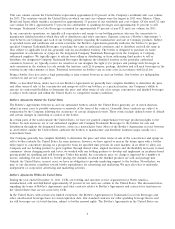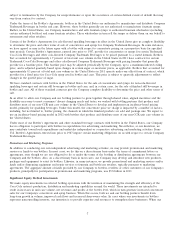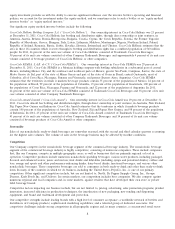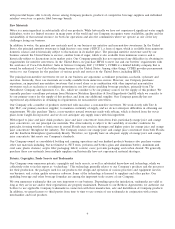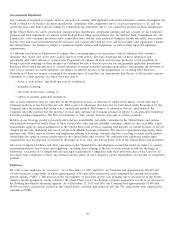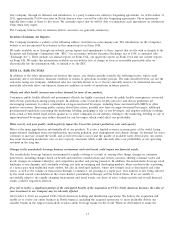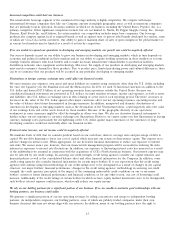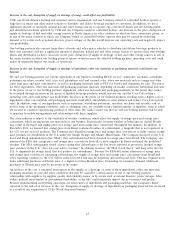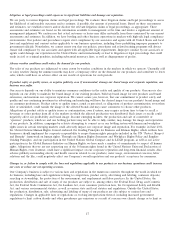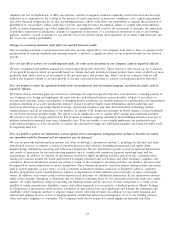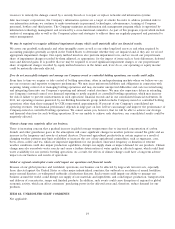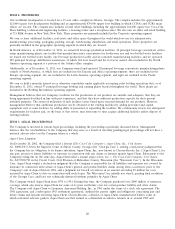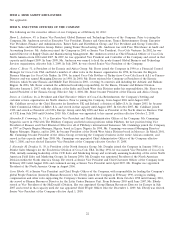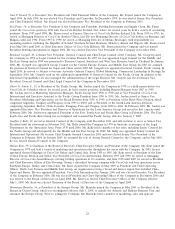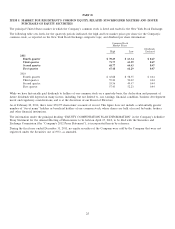Coca Cola 2011 Annual Report Download - page 18
Download and view the complete annual report
Please find page 18 of the 2011 Coca Cola annual report below. You can navigate through the pages in the report by either clicking on the pages listed below, or by using the keyword search tool below to find specific information within the annual report.Changes in laws and regulations relating to beverage containers and packaging could increase our costs and reduce demand for our
products.
We and our bottlers currently offer nonrefillable, recyclable containers in the United States and in various other markets around
the world. Legal requirements have been enacted in various jurisdictions in the United States and overseas requiring that deposits
or certain ecotaxes or fees be charged for the sale, marketing and use of certain nonrefillable beverage containers. Other
proposals relating to beverage container deposits, recycling, ecotax and/or product stewardship have been introduced in various
jurisdictions in the United States and overseas, and we anticipate that similar legislation or regulations may be proposed in the
future at local, state and federal levels, both in the United States and elsewhere. Consumers’ increased concerns and changing
attitudes about solid waste streams and environmental responsibility and related publicity could result in the adoption of such
legislation or regulations. If these types of requirements are adopted and implemented on a large scale in any of the major
markets in which we operate, they could affect our costs or require changes in our distribution model, which could reduce our net
operating revenues or profitability.
Significant additional labeling or warning requirements may inhibit sales of affected products.
Various jurisdictions may seek to adopt significant additional product labeling or warning requirements relating to the content or
perceived adverse health consequences of certain of our products. If these types of requirements become applicable to one or
more of our major products under current or future environmental or health laws or regulations, they may inhibit sales of such
products. One such law, which is in effect in California and is known as Proposition 65, requires that a warning appear on any
product sold in California that contains a substance that, in the view of the state, causes cancer or birth defects. The state
maintains lists of these substances and periodically adds other substances to these lists. Proposition 65 exposes all food and
beverage producers to the possibility of having to provide warnings on their products in California because it does not provide for
any generally applicable quantitative threshold below which the presence of a listed substance is exempt from the warning
requirement. Consequently, the detection of even a trace amount of a listed substance can subject an affected product to the
requirement of a warning label. However, Proposition 65 does not require a warning if the manufacturer of a product can
demonstrate that the use of the product in question exposes consumers to a daily quantity of a listed substance that is below a
‘‘safe harbor’’ threshold that may be established, is naturally occurring, is the result of necessary cooking, or is subject to another
applicable exception. One or more substances that are currently on the Proposition 65 lists, or that may be added to the lists in
the future, can be detected in Company products at low levels that are safe. With respect to substances that have not yet been
listed under Proposition 65, the Company takes the position that listing is not scientifically justified. With respect to substances
that are already listed, the Company takes the position that the presence of each such substance in Company products is subject
to an applicable exemption from the warning requirement. The State of California or other parties, however, may take a contrary
position. If we were required to add Proposition 65 warnings on the labels of one or more of our beverage products produced for
sale in California, the resulting consumer reaction to the warnings and possible adverse publicity could negatively affect our sales
both in California and in other markets.
Unfavorable general economic conditions in the United States or in other major markets could negatively impact our financial
performance.
Unfavorable general economic conditions, such as a recession or economic slowdown in the United States or in one or more of
our other major markets, could negatively affect the affordability of, and consumer demand for, some of our beverages. Under
difficult economic conditions, consumers may seek to reduce discretionary spending by forgoing purchases of our products or by
shifting away from our beverages to lower-priced products offered by other companies, including private label brands. Softer
consumer demand for our beverages in the United States or in other major markets could reduce the Coca-Cola system’s
profitability and could negatively affect our financial performance.
Unfavorable economic and political conditions in international markets could hurt our business.
We derive a significant portion of our net operating revenues from sales of our products in international markets. In 2011, our
operations outside the United States accounted for $27.8 billion of our net operating revenues. Unfavorable economic and
political conditions, including civil unrest and governmental changes, in certain of our international markets, as well as the
financial uncertainties in the euro zone, could undermine consumer confidence and reduce consumers’ purchasing power, thereby
reducing demand for our products. In addition, product boycotts resulting from political activism could reduce demand for our
products, while restrictions on our ability to transfer earnings or capital across borders which may be imposed or expanded as a
result of political and economic instability could impact our profitability. Without limiting the generality of the preceding
sentences, the unfavorable business environment in Venezuela; the current unstable economic and political conditions and civil
unrest and political activism in the Middle East, India, Pakistan or the Philippines; the civil unrest and instability in Egypt and
other countries in North Africa; the unstable situation in Iraq; or the continuation or escalation of terrorist activities could
adversely impact our international business.
16


